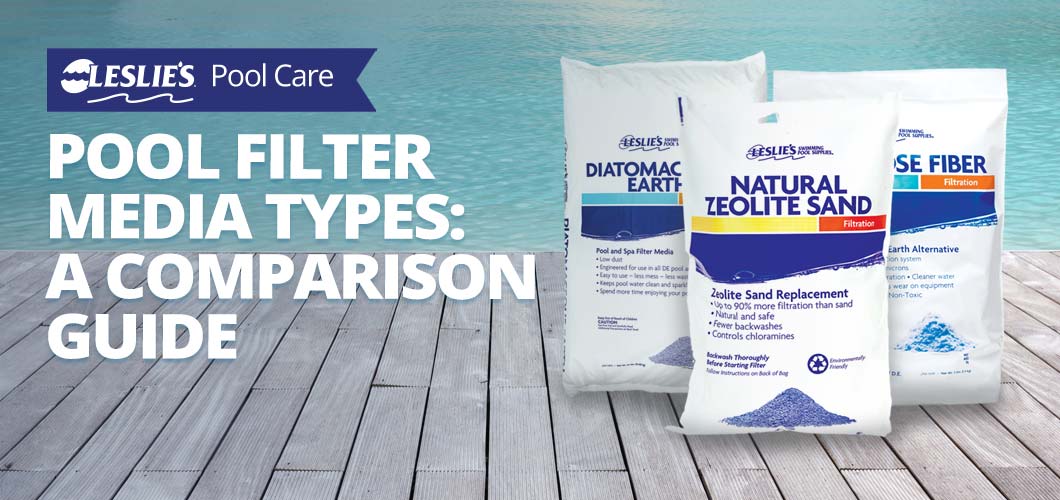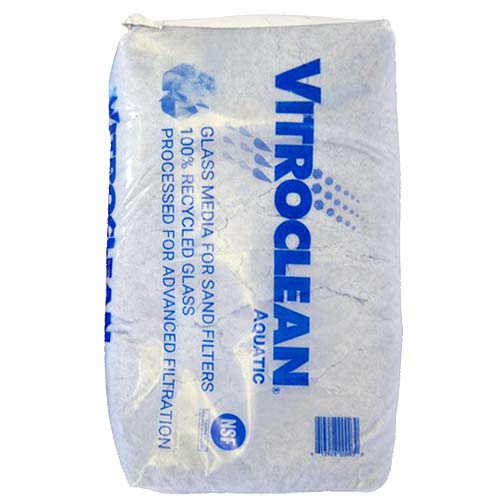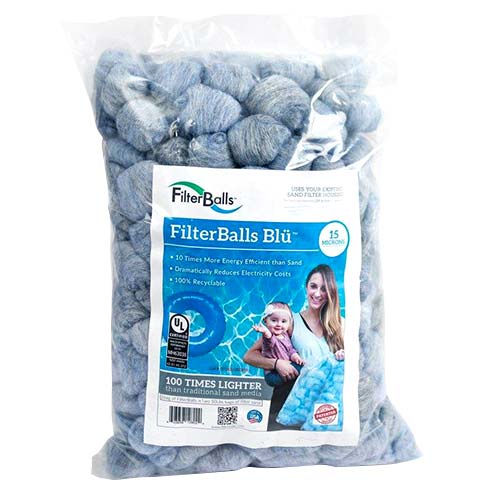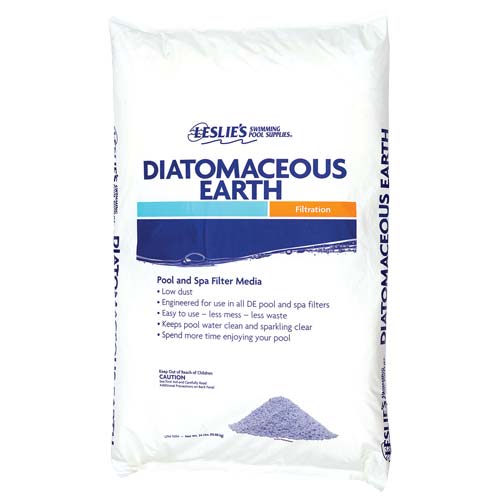
Pool Filter Media Types: A Comparison Guide
We’re about to let you in on a little secret. Just because you have a sand filter doesn’t mean you have to use actual sand in it. Likewise, just because you have a DE filter doesn’t mean you have to use diatomaceous earth powder. There are alternatives! But even if you use traditional filter media in your sand, cartridge, or DE filter, there are additives available to help increase filtration efficiency. In this post, we’ll cover some of the most common types of pool filter media to help you decide which one is best for you and your pool.
Types of Filter Media for Sand Pool Filters
Sand filters are one of the most popular types of swimming pool filters. This is because they’re the least expensive to buy, and their low maintenance is appealing to many pool owners. With the right filter media, their filtration efficiency can rival that of a more costly cartridge or DE filter.
Sand
Filtration ability: 20–40 microns
Although traditional #20 grade silica pool filter sand is one of the least expensive options available, it’s also one of the least efficient. But there are many ways to boost its filtration efficiency! On average, this type of filter media will last about 3–5 years. However, it can last even longer with regular cleaning and maintenance.
The dust can be harmful if inhaled, and old sand can harbor bacteria and other unpleasant contaminants. That said, it’s extremely important to wear a mask to protect yourself when changing out silica sand.
PRO TIP: Want to use sand, but looking for a way to increase its efficiency? Just use cellulose fiber as a filter additive! Cellulose fiber is a safe, all-natural way to maximize filtration ability. In fact, it can capture particles as small as 2 microns. Just be aware that this additive can increase filter pressure more quickly, especially after you first add it to the filter. Cellulose fiber may also shorten the amount of time between backwash cycles.
Zeolite Sand
Filtration ability: 2–5 microns
Considering zeolite vs. sand? Zeolite, a mineral found naturally in volcanic rock, offers many benefits over traditional silica sand. In fact, replacing the sand in your filter with zeolite filter media can provide up to 90% more efficient filtration than sand alone, rivaling the efficiency of diatomaceous earth. This natural and safe alternative has a honeycomb structure that traps ammonia, which helps control chloramines. The result is a more comfortable swimming experience, with reduced skin and eye irritation.
With zeolite, you won’t have to backwash the filter as often. However, because this filter media is absorptive, the backwashing cycle usually takes a bit longer than with sand media.
The good news is you’ll only need about half as much zeolite in your filter tank — 50 pounds of zeolite is equivalent to 100 pounds of silica sand. Zeolite also tends to last longer, around 4–6 years, meaning you won’t have to replace the filter media as often. Although zeolite costs quite a bit more than sand, the benefits speak for themselves.

Glass
Filtration ability: 3–5 microns
Although not as common as sand or zeolite, glass filter media is still a great option for sand pool filters. Made from recycled glass, it provides many of the same benefits as zeolite, including the reduced need for backwashing and superior filtration. Even when backwashing is necessary, glass pool filter media requires a much shorter backwash cycle. Glass filter media is lighter and less dense than sand, which allows it to release debris quickly. Glass doesn’t tend to channel like sand does, meaning your pool water won’t bypass filtration as it flows through the filter media.
The greatest benefit of glass is its longevity — you can expect your glass filter media to last for 10 years or longer. For the environmentally conscious pool owner, glass offers a small carbon footprint and greater water conservation than other media types. Although it’s one of the costliest sand filter media options, the expense evens out once you figure in the longevity, efficiency, and other benefits. It’s most commonly used in commercial pools, but is gaining popularity in residential applications.
FilterBalls
Filtration ability: 5–15 microns
If you’re looking for a lightweight alternative to sand filter media, look no further than FilterBalls. One cubic foot of FilterBalls replaces, and even outperforms, up to 100 pounds of sand. On average, FilterBalls can handle up to 20 times more dirt and debris than regular silica sand. You'll appreciate the less frequent, shorter backwash cycles! Besides their superior filtration ability and light product weight, FilterBalls offer many benefits that other types of filter media can’t provide.
They offer a 45% higher flow rate, which helps save wear and tear on your pump, leading to increased energy savings. They’re also hydrophobic, meaning you won't have to worry about them clumping together or binding off inside the filter because they don't attract water like sand does. When it comes to eco-friendly benefits, FiterBalls are recyclable and pose no health or environmental hazards, making them a smart solution for pool filtration. Let's not forget to mention that they’re freeze resistant and chemical resistant. Expect about 4–5 years of use before having to replace FilterBalls.
Types of Filter Media for Diatomaceous Earth Pool Filters
Diatomaceous earth (DE) pool filters are top of the line when it comes to filtration efficiency. However, the nature of DE powder can leave pool owners looking for alternative solutions.
Diatomaceous Earth
Filtration ability: 3–5 microns
DE powder is one of the most efficient filter media types available, and does a superior job at keeping your pool clean and clear. It’s a naturally occurring siliceous sedimentary rock made up of the fossilized remains of diatoms, which are tiny, hard-shelled aquatic organisms.
Although it’s a natural product, DE powder can lead to serious health implications if not handled correctly. It’s extremely important to read and follow all usage and handling instructions when using this product. DE powder is relatively inexpensive compared to its alternatives, which adds to its appeal.
PRO TIP: No matter which type of pool filter media you use, it's important to keep the media clean so it stays in good working order. In addition to your routine backwashes or cartridge rinses, you should regularly use cleaning products that help break down oils and scaly buildup inside the filter. Not only will this boost your filter's overall performance, but it will also help your filter media last longer. Routine use of pool enzymes will also help keep oily buildup under control.
Cellulose Fiber
Filtration ability: 2 microns
Made from natural wood pulp, cellulose fiber pool filter media is a safe, non-toxic alternative to diatomaceous earth. It’s non-abrasive, resulting in less wear and tear on your equipment. Unlike DE powder, cellulose fiber is biodegradable, making it an ideal option for environmentally conscious pool owners. It’s not just for DE filters, though. Cellulose fiber can also be used as a filter additive for sand and cartridge filters to maximize filtration performance.
Keep in mind that cellulose fiber is compatible with all filters and pool types, as well as most pool chemicals. However, use caution when using cellulose fiber with polymer chemicals that coagulate particles in the filter. This includes phosphate removers, clarifiers, metal removers, and certain algaecides. The combination of polymers and cellulose can clog up the filter quickly if left unattended. Using cellulose fiber as an additive for less efficient filter media can also result in fast clogging and increased filter pressure while the fiber works to remove microscopic contaminants in the water. Be on standby, and clean the filter as necessary to prevent unnecessary strain on your pump and filter.
Perlite
Filtration ability: 3–5 microns
Perlite is another type of natural filter media that occurs in volcanic rock. When exposed to high temperatures, kernels of natural perlite “pop” like popcorn up to 20 times its original size. The result is a highly porous material with lots of tiny air pockets, making it ideal for filtration purposes. It’s also incredibly lightweight, weighing only about 2 pounds per cubic foot. When using perlite, you’ll only need about half as much as when using DE powder. A few other benefits include less bridging between grids, longer periods between backwashes, and more complete backwashes when it’s time to do so.
Types of Filter Media for Cartridge Pool Filters
This section will be short and sweet, because there’s only one!
Filter Cartridge
Filtration ability: 10–20 microns
If you have a cartridge pool filter, you only have one option for your filter media: a filter cartridge. That said, not all filter cartridges are created equal. Once you’ve identified the correct size for your replacement filter cartridge, look at factors like the square footage and fabric weight if multiple cartridges are available. The higher the fabric weight, the better the filtration ability — most filter cartridges have either a 3 or 4 ounce fabric weight. Also, the higher the square footage, the higher the pleat count, meaning it can trap more debris between the pleats and go longer between cleanings. Certain filters are made with Microban technology, which can help fight mold, mildew, and bacteria in the filter to keep it cleaner longer.
PRO TIP: Want to increase filtration efficiency for your cartridge pool filter? Just add clarifier! Using a product such as Leslie’s Ultra Bright Advanced will coagulate microscopic particles in your water, making it easier for your filter to remove them as the water passes through. Clarifiers are compatible with all filters. However, use caution when using it with filter media that already has a high filtration ability, as it can cause your filter pressure to rise quickly. Pools using superior filter media usually won’t require clarifier in the first place.
Have Questions? We Can Help!
If you're not sure what type of filter media will work best for your pool, just ask the friendly experts at your local Leslie's. Whether you have a sand, cartridge, or diatomaceous earth filter, we can help you maximize filtration so your pool stays clean, clear, and beautiful.

